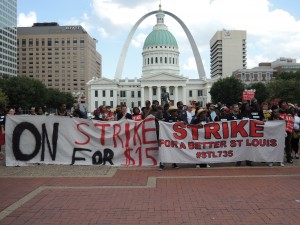12 arrested locally for civil disobedience

Labor Tribune photo
By TIM ROWDEN
Associate Editor
St. Louis – Area fast food workers hit the streets again last week demanding $15 an hour and the right to form a union without retaliation.
It was the third such action in St. Louis and the largest nationwide, with workers in dozens of cities participating.
Inspired by their brothers and sisters from the March on Washington and Jefferson Bank demonstrations 50 years ago, 10 fast-food workers, one of their grandmothers, and a supporter from the community, were arrested in an act of civil disobedience outside the Old Courthouse after they wrapped themselves in a strike banner and sat in the street blocking traffic at Fourth and Chestnut.
‘BEGINNING OF A LONG STRUGGLE’
“This is the beginning of a long struggle,” the Rev. Dr. Martin Rafanan, co-chair of the Missouri Jobs with Justice St Louis Workers Rights Board and community director for the fast food workers’ STL Can’t Survive on $7.35 campaign said following the arrests last week.

“We had workers that really wanted to take the next step to bring this message to the community,” he said. “They felt that it was necessary to take an action which would allow them to bring the message in a more powerful way.”
“These low-wage jobs are growing,” Rafanan said. “Fifty-percent of St. Louis will be low-wage jobs by 2020. We’ve got to get out in front of that. We have to make sure that corporations that are highly profitable and successful pay a fair compensation to their workers.”
NATIONWIDE ACTION
Nationwide, the strikes hit nearly 1,000 major national fast-food restaurants, including McDonald’s, Burger King, Wendy’s and KFC. In Seattle, coffee baristas joined in for the first time. Retail workers at stores like Macy’s, Sears, Victoria’s Secret and Walgreens also went on strike in some cities. The nationwide strike followed fast food and retail worker strikes earlier this year in New York, Chicago, St. Louis, Detroit, Milwaukee, Seattle, Kansas City and Flint.
In St. Louis fast-food workers began the day at a McDonald’s South St. Louis. Workers then went downtown to several fast-food places and conducted worker-led speak-outs, before traveling to a Wendy’s in Rockhill, where workers from the morning, afternoon, and evening shift were out on strike and the store opened late.
‘SIGN OF THINGS TO COME’
From Austin to Chicago, from New York to San Diego, tens of thousands of fast food workers nationwide – along with some retail workers – participated in the one-day strike, demanding higher pay, respect on the job and the right to organize into unions without management interference.
Their walkouts closed McDonald’s, KFC, Burger King and other fast food chains in cities from coast to coast, and occurred both in pro-worker metropolises such as Chicago, New York and Los Angeles and less-friendly environments such as three Texas cities.
Unions and their leaders enthusiastically backed the walkout, and many joined the picket lines.
“This is a sign of things to come,” AFL-CIO President Richard Trumka said. The striking fast-food workers “are a vanguard for a change in the economy. There is growing momentum with different groups of workers saying, ‘We’ve had enough.’”
Around the country, The Service Employees International Union (SEIU) is providing financial and technical support to the campaigns throughout the country and is lending staff to help train organizers on the ground in each of the cities.
NOT JUST KIDS FLIPPING BURGERS
It’s not just kids flipping burgers after school who are demanding the living wage. A majority of fast-food workers are adults, with most supporting families.

Andre Houston, 24, a crew manager at an East St. Louis McDonald’s, is one of those young adults. He has worked at McDonald’s for four years and brings home $8.50 an hour. He lives with his mother, brother and sister. His mother works in the health care field. Their two incomes support the family.
“My family is hurting,” he said. “We are here to let these corporate thugs know that we deserve $15 (an hour). We work too hard. We’re out here fighting for our rights. It ain’t easy. It’s going to take the people to make that change.”
There are more than 36,000 fast food workers in the St. Louis area. Their median wage is $8.80 an hour.
(Press Associates Union News Service contributed to this report.)


Fast food employment is meant as a transitory stop on the way to better employment. Seasonal and temporary in nature. If you desire to support a family, pay mortgages and built a nest egg for the future upon retirement, this is.not the place to be.Paying 600.00 per week to flip burgers plus benefits is a sure way for franchises to go bankrupt at a time we need jobs desperately.No one forces these individuals to work at these franchises. You don’t like their pay scales , go somewhere else. Its called Democracy. Better still pull your resources and open food outlets paying 15.00 an hour, lets see how long you last.
Don’t like Wendys pay scale . Don’t work there. no ones putting a gun to your head. Stop bugging the rest of us.